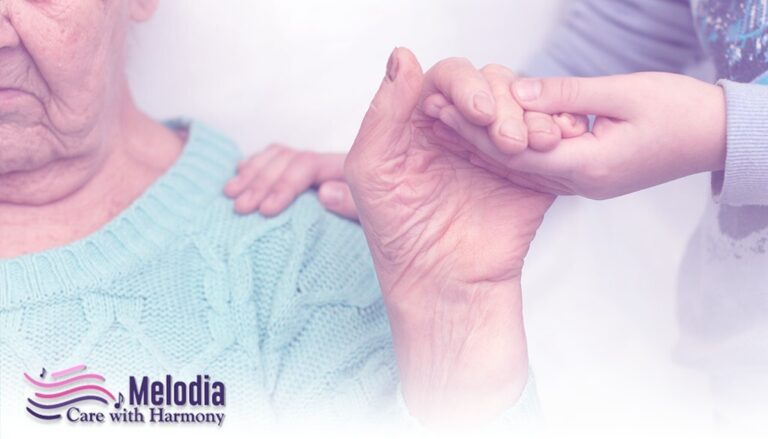Hospice Emotional Support & Spiritual Care Alameda City, California
Hospice care can help your loved one cope with the physical discomfort and symptoms of a terminal disease. But what about the emotional pain they may be experiencing quietly or the spiritual needs they may require as their life comes to an end? Dame Cicely Saunders, the originator of modern-day hospice care, famously said, “Spiritual care is not an optional addition for the dying.” To put it another way, spiritual care is an important aspect of end-of-life care.
Emotional and spiritual care are especially important for people as they approach the end of their life and we prepare this position statement to emphasize the importance of spiritual care.
We can assist your loved one’s spirit at Melodia Care, regardless of their personal spiritual views or faith.
Emotional Care

A terminally ill patient has a tendency to think a lot. This can lead to life regrets, missed chances and decisions that people wish they could go back and change. All of this thinking can lead to depression, which can significantly reduce the patient’s quality of life for the remainder of his or her days.
Hospice teams include social workers who are trained to listen to a patient’s worries and stories. They will make every effort to respond to each issue with compassion and care. Similarly, family caregivers experience despair and anxiety, which they often suppress in order to avoid further distressing the patient. These are difficult times and people require assistance.
Spiritual Care

Concerns about what happens after death naturally develop in the mind of the patient. People can become worried, especially if they haven’t had a positive religious experience in their lives. Everyone has the right to their own ideas and some people will battle with them throughout this time. They require trained counsellors who will listen to them and their stories. Veterans, in particular, often have regrets or concerns regarding judgments made during wars. They had to go through a lot of bad stuff. Many veterans struggle to understand those feelings and how they can be related to spiritual things.
On many levels, a terminal disease can be discouraging for the patient and family members. It can have a negative impact on one’s emotional, spiritual and social well-being. Hospice care focuses on the patients and their families health and well-being. When someone is diagnosed with a terminal illness, they are likely to experience a range of emotions, including anger and melancholy. When hospice care is hired, the entire patient’s health is addressed.
Emotional Support & Spiritual Care
Patients and their families are surrounded by a variety of therapeutic resources that ensure quality of life at the end-of-life stage with hospice care.
Hospice teams are also uniquely trained to provide spiritual/emotional care, care which respects traditions and beliefs and care that recognizes and respects the unique experiences of military veterans as they approach death.
End-of-life care must take into account all aspects of a patient’s and their family’s belief systems as well as their general medical circumstances. Melodia Care provides a plan to meet all of your requirements.
All patients, as well as their relatives and caregivers, can get emotional and spiritual care, whether or not they are religious.
How Can Spiritual Care & Emotional Support Help?

The unknown territory can make people worried or fearful, especially if they are coping with a terminal condition. The end of life, on the other hand, can be a period of caring. Participation is open to both patients and their families. It can be a time to create memorable events and tell life-affirming stories. It can be an excellent time to relax.
Melodia Care Hospice’s emotional and spiritual support focuses on enhancing quality of life by:
- Providing you and your loved one with comfort and dignity at home.
- assisting you in identifying the roots of your fears and anxieties so that you can address them
- Reducing stress so you can focus on personal or family matters like making changes.
- Developing your spiritual or religious beliefs or practices, as well as your cultural history, as a source of strength and peace.
What Are The Spiritual And Emotional Needs Of A Person?
To different people, spirituality means different things. A state or circumstance that must be met in order for us to experience happiness is referred to as an emotional need.
Spirituality can include religion and faith yet spirituality is not always religious. Whether or not they follow a religion, everyone has spiritual needs at some point in their lives. Spiritual requirements may include:
- Our desire for life’s meaning and purpose.
- The desire to be loved
- A desire to be a part of something bigger than yourself.
- The desire to feel hopeful, peaceful and grateful
Depending on what’s essential to them, people do different things to meet their spiritual requirements. Some people practice their religion through praying or attending religious services. For others, it may be spending time with friends and family, spending time in nature or working & engaging in hobbies.
How Can Assess Someone's Spiritual & Emotional Needs?
Encourage your patients to express their emotions. If a person’s spiritual needs aren’t being satisfied, it’s possible that they have spiritual needs that aren’t being addressed:
- ‘Why is this happening?’, ‘Why me?’, ‘Who am I?’, and ‘How will I be remembered?’ are examples of searching for reason.
- I’m withdrawing and isolating myself more.
- I’m terrified of being alone.
- Refusing to accept help.
- Expressing their fear or concern
Many health and social care workers find it difficult to talk to their patients about spirituality. Some of the causes behind this are as follows:
- A lack of experience
- I’m speechless.
- Being afraid of expressing anything that isn’t acceptable
What Can You Expect From Spiritual And Emotional Support?

As a person approaches the end of their life, they frequently become more conscious of what matters most to them. They may feel responsible to provide explanations to loved ones or they may need confirmation that their loved ones will be okay when they pass away. They may consider how they would like to be remembered.
You may have concerns or issues to work through if you are a caregiver, a family member or a close friend. You may have to deal with strong emotions while attempting to care for your loved one. You may be faced with difficult choices, whether or not you have family to support you.
What To Expect From Patients?
- Assistance in recognizing and putting into words what they’re going through and feeling.
- Assistance with completing any outstanding tasks or reconciling with themselves or their loved ones.
- Advice on how to have meaningful conversations with loved ones to affirm love.
- Assurance that their family will be taken care of and that their name will be remembered.
- As needed, make contact with clergy or a faith community.
Expectations For Caregivers
- As you deal with loss and other painful feelings, listen and affirm yourself.
- Guidance in making decisions about care, including resolving family issues.
- Encourage you to have critical dialogues with your loved one or other members of your family.
You may feel unable to take a break if you are so preoccupied with your loved one’s demands. A social worker can help you arrange for respite care so you can have some time to yourself. Social workers can also help you set up advance directives and get help from other groups.
Funeral and memorial services can be planned with the help of social workers and spiritual care counsellors. All Melodia Care employees are trained on a regular basis to guarantee that you are treated with respect and dignity.
How Can Provide Spiritual & Emotional Care?

Spiritual and emotional care can be provided by any health or social care provider but some patient may require additional assistance from specialist such as chaplains or faith leaders.
Everyone has different requirements. Ask about your patient’s priorities and what you can do to assist them.
Some people may find that carrying out their own spiritual practice satisfies all of their spiritual needs. Others may require practical assistance in order to do the activities that are essential to them as their sickness progresses. You can assist them by arranging for them to attend a religious service, meet with a spiritual leader at their home or where they are staying, spend time with family and friends or go outside.
Some people will require additional assistance and may like to discuss their spiritual and emotional concerns with you. Encourage the individual to talk about their anxieties and fears. Listen to their problems without passing judgement or dismissing them. Without imposing your own opinions, try to comprehend and listen to your patients. If you don’t feel comfortable conducting these discussions, get the help of an experienced colleague or an expert.
Finding out more about how they are feeling for themselves may be beneficial to certain people. You can recommend that the patient read our content on emotional and spiritual grief.
Caring for those who are dying can be extremely taxing. It may cause you to ponder upon your own mortality, your beliefs and your search for meaning and purpose in life. Take some time to care for your spiritual well-being. If you’re having trouble, you might want to talk to your counsellor, a psychologist or a religious leader.
Melodia Care provides emotional support and spiritual care is a major component of its services. We provide holistic care, which means we look after the person. Supporting a person’s mental well-being is just as important as addressing their disease’s physical symptoms.
You can reach us at any time by contacting us through our 24/7 online customer support chat or by calling 1-888 635-6347 (MELODI-7) & Melodia Care Hospice.
